“Elegy for Gabriel Contreras”by Elizabeth Monreal Your blood was the deepest red my town had ever seen But your face remained that of an angel’s, White and soft, untouched by death. The sun kissed your cheek, Not wasting a beam of its light on anything else. You remained golden, you remained bright Even as we died slowly in darkness. Your laughter haunts this town. They say it was like honey, like morning dew. And now all of this has become you: The whisper of rain, the dim glow of fireflies, the fragrance of flowers Adorning the gentle earth that your shadow once touched. Your goodness haunts this town. Your body makes this earth fruitful, But your grave makes all your mourners blind to its beauty. The absence of your soft soul Warming their desolate streets Made a wasteland out of a paradise. This you would not recognize as your town. Your legend echoes from here to Guadalajara And no city escapes you. They named their sons after you, Gabi. Their tears fill up their wells. You keep them nourished even in their melancholy. Here, a foreigner might hear your name Taken by the wind and think you are a god “Is he a martyr? Is he a saint? Who is this Gabriel you all worship so?” You are the last good thing Anyone will ever know of this town. Gabi, if this must be your death, Let it be your last. Because in all the years after, they still tell your story here And you still die at the end of each retelling. But when the melody of your footsteps Walks your mother back home at night, We know the sun will rise once again on this town. Gabriel Contreras Ruiz 24 de marzo 1977 — 30 de abril 1992 Nacido en Cítala, Jalisco, México Gabriel “Gabi” Contreras Ruiz died in a car accident when he was fifteen years old. He was on a class field trip, riding in the trunk of a classmate’s truck with several other classmates. On the way to Teocuitatlán, the truck hit a rock, causing it to flip upside down. All of the children were hurt, but only Gabi passed away. The people of Cítala continue to remember him as a force of goodness in their town.  Elizabeth Monreal is a Mexican-American writer who lives in Las Vegas, Nevada. She is currently studying Secondary Education at Nevada State University. In her free time, she enjoys writing, reading, playing the violin, and sleeping (when she has the chance).
0 Comments
AVE ATQUE VALE |
| “Like Jacopo Robusti Tintoretto (1518 - 1594, Venice, Italy), George Yepes has the ability to pull down from heaven the designs which God has for humans and paint them so people can discover through the paintings what they are deaf to in words.” |
| Dr. David Carrasco, Professor - Historian of Religions, Editor-in-Chief, Oxford Encyclopedia of Mesoamerican Cultures; Director, Moses Mesoamerican Archive and Research Project, and Neil L. Rudenstine Professor of the Study of Latin America, Divinity School - Harvard University |
La Uvalde Dolorosa bears the pain of 21 bleeding wounds for the 21 victims: Her Sacred Heart skewered with 7 daggers and 14 large swords piercing her chest and abdomen.
The Uvalde pieta banner is draped across her lap.
La Dolorosa/Virgen de Guadalupe wears the crown of thorns from the crucifixion.
Behind La Dolorosa is her flaming aura of La Virgen de Guadalupe.
La Dolorosa's green cloak of La Virgen de Guadalupe has turned to ultramarine blue with white stars.
Her white gown is marked by the bleeding flow from her Sacred Heart and abdomen to form the red and white stripes of the United States flag.
Above and behind La Dolorosa is the cross of the crucifixion carved into the Uvalde oak tree from the City Seal of Uvalde, Texas.
The 21 Doves above La Dolorosa/Virgen de Guadalupe are the ascending souls of the Uvalde victims.

More on the artist at: http://www.georgeyepes.com/
“The Battle”
Tears dripping down my face as I wipe them aside.
The sound of my dangling bracelet as I wipe away the tears.
I've cried in silence like this for so many years.
The sound of his snores as he fell fast asleep.
No worries for him as I lay beside him and weep.
I stare into the darkness with my mind in deep, deep thought.
The demons returning, even the old ones that I fought.
I fought those demons and won, or at least I thought I did.
The boiling war in my brain and they removed the lid.
That stench of darkness that never left, it was hiding deep inside.
I tucked them away to forget, or at least I tried.
A woman in my 40s yet I'm still that little girl, dancing in my homemade dress and gave a little twirl.
Dancing took my mind off things and writing helps release.
And just for those short moments, I brought myself some peace.
As I lie here in this pitch-black room, I see a tiny light.
The smoke detector floating from the ceiling, and then I get that feeling.
That little light is my hope, amidst the battle in my head, the light gets a little brighter.
One day at a time she said.

“The Jolly Chicano Poet
A Chicano Poet Remembered:
Francisco X. Alarcón (d. 2016)”
Both in girth and spirit
He lived his life as a poem
A poem without boundaries
Even his poetry book titles
Eran preciosos: Mariposas sin fronteras
He believed a poem was never complete
It took death to provide a final stanza
To his own poetic journey
A progenitor of much fine poetry
His verse landed on the page
Filtered through a Chicano lens
His style was eclectic
Using any form that conveyed
The content of his soul
His verse favored exploring Chicano culture
Mesoamerican history and Latino identity
Most of all, he was a progenitor of bilingual children’s poetry
He proclaimed such poetry his crowning achievement
He thought children natural poets
And encouraged them to versify
Gay and married
He felt an outlier
Gay and Chicano
He had to tread lightly
But he approached life’s dilemmas with doses of humor
Such as daily “thanking God” he was an atheist
On his death bed, he allowed his priest brother to give him last rites
“If you keep it short”
When his mother heard he had agreed to take communion
She exclaimed: “Does he know what he’s eating?”
Let us nurture the glory of the Chicano poet, too few in number
Select a poem by the poet Alarcón and shout it out to the world
Do this in remembrance of him
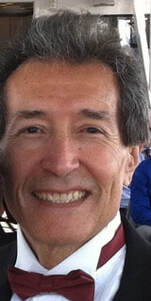
“Después de la estela” and
“Caja de memoria”
Yellow wallpaper
peels
behind faded pictures
in dusty frames,
falling to the floor
in ashen drifts—ephemeral--
of births and wakes,
stabbing
to the heart
like first kisses
or cold sips
of Mexican Coke
but dulled
from memory
(and time)
like giftless Christmases
and old housedresses,
drying on the line.
What ghosts roam these halls,
Haunting bowls
of waxed fruit
and glass doorknobs,
lingering ‘round saints’ alters,
dust bunnies,
and jelly jar glasses
like palls
or the bitter of burnt almonds.
As a pale pink echo
of rose
peeks through the air’s must,
a voice whispers, “Recuerdas esto, ahora,”
leaving me to chuckle and smile.
How silly it is to mourn life as we live it.
Fingers,
gingerly sifting
through ecos de lavanda,
praise spirits
of modest treasures
in silent prayer.
Ribbon-tied letters.
A lock of hair tied with blue ribbon.
Viejos dólares de plata.
Tarjetas de oración a los santos (two for St. Jude).
Pressed flowers in wax paper.
A faded scapular.
Old report cards (Never was any good at Math).
Broken reading glasses.
Una camelia encerada
and
the smell of her.
Amén.

El Martillo
by David Vela
My father had every type of hammer:
Black-handled, rednecked claw hammer, Craftsman, ‘made in America’ (He was proud
of that);
Black-handled, rednecked Ball-Peen hammer, Craftsman, ‘Made in America!’ (He made
sure to tell me this);
Blondehandled claw hammer; then, a two-pounder, worn, worthy of a warrior who
straightened things, metal and moral;
Finishing hammers, hammers that mom did not know about until much after he bought
them “This is my money, mijo, don’t tell mama.”
He proudly stated, “look how well-made,” as he showed me the mallets and other
hammers that fed us,
And which he used to build the addition to our house, build a garage, frame, shape
Nail.
He was proudest of those that were his friends, his companions, those he altered,
shaped, the steel worn, the ballpeen softened, the rounded ends flattened or bevelled;
For the fence he built on the side of our home, righthandside, as you looked at the
house, he used his hammers;
For the metal door he emplaced on the lefthandside, a door he made from sheetmetal
He welded, shaped, something from Mexico in the U.S., he used his hammers.
He hammered and hammered, his hearing going as he did so, and I oblivious, was
frustrated when he asked me to repeat things.
In Mexico, Papa was a pailero, boilermaker; In the U.S. his work was as a welder,
bumper-straightener and chrome-plater;
He wielded hammers at work and at home, forearms bigger than most men’s biceps,
biceps rounder than most men’s deltoids.
“Mr. America” is what the pastor of our church called him, if not “Mr. Universe.” He
sought priests for counsel and his hammers to shape.
He had a sledge, which as a boy I tried to heft but failed to raise above my shoulders.
He taught me later how to do so safely, effectively, deadly-right. What power I felt and
what a gift passed on to me by way of his tool — I felt a warrior, finally.
The accuracy of hammering a nail he taught me, ‘no, mijo, not like that; do it over until you get it right,’ — this time, delicacy.
His hammers went to the four winds after he died: My brothers and their wives borrowed them. They ended up in the back of pickups — stolen; in garages, lost (divorces).
There is an emptiness in my heart and soul for those hammers, like the emptiness I
filled when I visited Toledo, España where I found our name, Vela, amidst craftsmen,
Jewel-makers —
Men using, wielding tiny hammers, making out of gold and silver earrings, pendants,
wonders, tiny jewels they emplaced with tiny hammers brought me back to him
His work, his name, his purpose.
And I having found that forebears in Toledo used hammers to make of Damascus steel
Swords, shields, and armor for warriors felt closer to him, my hammer my pen, my page metal shape, my words the indentations, impact, bent ideas, but memory all the same.

Hijo de soldador y pailero, a mother who was indomitable and self-educated in three languages, David studied at Yale and the Claremont Graduate School literature in English, Irish and Latin American authors, and has devoted 25 years to teaching literatures of Native Americans, Latin Americans, French (in French), Irish and British authors; he also loves and reads and has taught authors in Italian, including Dante and Petrarch, Boccaccio and Eugenio Montale.
David was lead instructor in Paris in 2006 in a Study-Abroad program, teaching Latin American and American expatriate authors in a French Life and Culture course, and a course on terrorism and the French experience in Algeria during the Algerian war for independence. David has worked with military veterans and with Social Science professionals as writer and Editor. He was President of the Irish Literary & Historical Society of San Francisco, the only non-Irish or non-Irish American do be elected to that position for and continues to be a Board Member of that organization. He was Chair of the Irish-Mexican Association of the Bay Area for several years, recognizing the common historical and cultural connections between these cultures, and emphasized the prominence of heroes in first-responder professions from these cultures.
David has worked with ambassadors and political personages in valuing and in disseminating culture in Ireland, Argentina, Mexico and in the United States, Northern Ireland and in the San Francisco Bay Area.
He currently resides in Las Vegas, Nevada after living in the Bay Area for 28 years.
Toil and Soil and Privilege
by Joe Menchaca
white people gather for a track meet
toil and soil and summer sweat
rows extending to the end of dreams
melt youthful vigor into
puddles of warm despair
across the road they’re gathering
’neath the cover of umbrellas flowering
like tulips blooming in the manicured turf
they’re sitting on nylon camping chairs
’n sipping cold-sweat bottles of Gatorade
pulled from coolers the colors of fire & ice
I’m so hot and thirsty tired and dirty
said the little boy to the relentless sun
but we don’t go home until the field is done
while across the road cheers and laughter
and idle chatter waft on breezes carrying
the scents of sunscreen ’n privilege
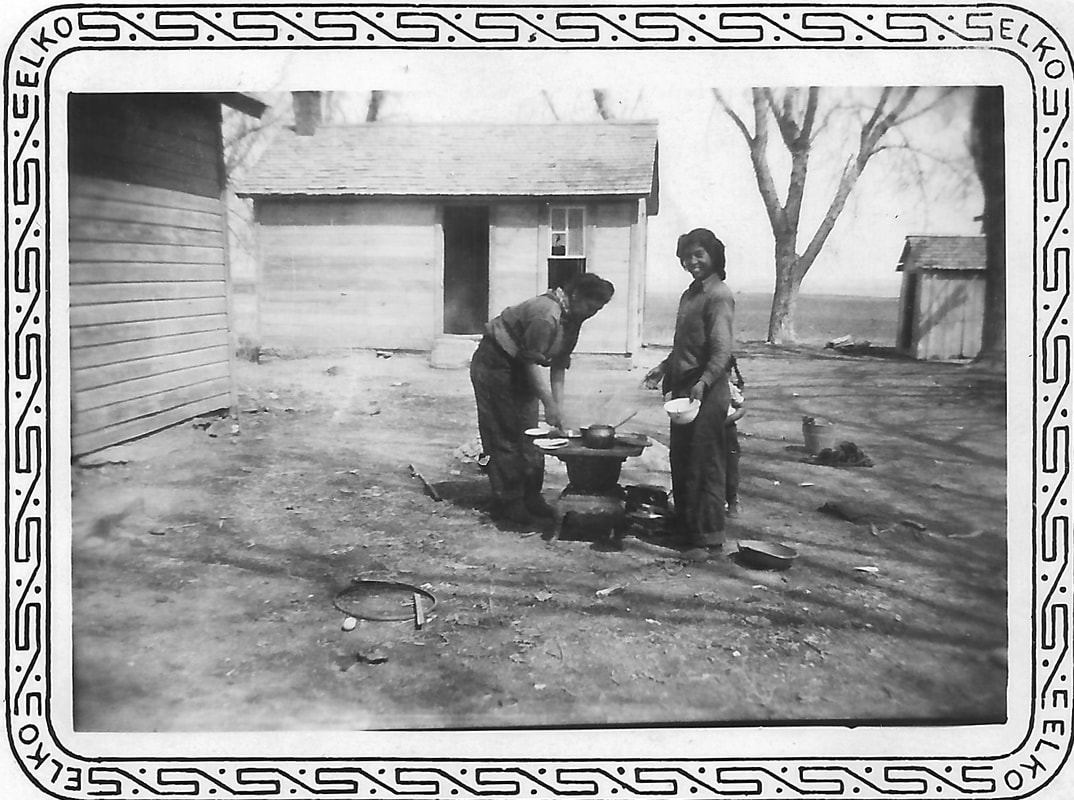 Mom (right), Aunt Jennie (left)
Mom (right), Aunt Jennie (left) In his words: The one of my mom and great aunt Jennie was taken at a migrant worker camp called a "Colonia." The next one is of my Great-Grandmother, the full-blood Yaqui from Mexico; my brother and sister and I called her Amah. Third one is my Great-Uncle and cousin in between members of one of the families who worked the fields with them. Those three were taken in Weld County, Colorado in the early 1940s. The fourth one is my aunt in a beet field taken some time in the 1930s. I included that one because it closely aligns with the poem's opening line even though it's not of a "little boy." They didn't take pictures of themselves working in the fields because once the work started, as the poem says, they don't stop until the field was done.
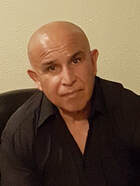
Three poems from City on the Second Floor with review and short interview with poet Matt Sedillo
Los Angeles is falling apart
In the streets, in the suburbs
In the wind
In a barely kept Hollywood bathroom
Wheezing, vomiting, coughing up blood
The past few days, these past few years
I have spread myself across this sprawl
And now fear this drive may kill me
May kill us all and I wander
Over to general hospital
Between whose walls desperation wears in high concentration upon the faces of the shopworn
And prematurely ill alike as they await upon news of illness they cannot afford to have
Survival without insurance
This may take a while
Los Angeles
Is full of untold misery
A homeless man sleeps next to me and I can smell the years of hard distance between who he is now
And who he may have been
And all that stands between him and the bitter wind
Is chance, is the kindness of a night nurse who will let him sleep in peace
Los Angeles is full of good people
Who from time to time
Can turn a blind eye
To killer policy
And I wonder how many more bounced checks, free clinics, carry cash
And leave the account in the negative
Stand between me and him, me and the bitter wind and if so
Where would I go from Venice to San Francisco
There is an outright war on the homeless
A war on the dispossessed, there are fewer and fewer options
They got shelters for women and children, all inadequate
But for me just man up homeboy
To that concrete pillow
To that cardboard blanket
And freeze your ass to death
Yes, this city will leave you to die
On the same stretch of sidewalk where banks stretch into the sky
And I wonder as even now skid row Is being gentrified
As this city
As this system
As the pigs
Push people
Past poverty
Past hunger
Past homelessness
Towards the very edge of existence
On Skid Row
Where all the so-called complexities of an economy
Are laid bare, where the rich are literally stacked upon the poor
Los Angeles
Is full of grotesque absurdity
Especially on skid row
Where they spend millions
Annually policing the misery of people with nowhere to go
Because when your pockets are empty
And you aint got nothing
And change is just not coming
There is no real difference
Between a booming metropolis and a barren desert
And the world of money
Passes by you
Passes through you
As though you
Were just part
Of the scenery
Protected in the knowledge
They are serviced by pigs
Who speak the language of violence
The language
Of the nightstick
The language
Of untold misery
That will beat you for begging
Beat you for sleeping
Beat you for breathing
Beat you
For doing whatever it is you need to do
To survive the night
In the bitter wind
Los Angeles
Is full of pigs
The rich, well they're not like you and me
They see an opportunity and they grab it reach for the stars
And they, put ‘em in their pocket
Company stays in the red
But they're backed by the government
Snort the public dime into lines of pure profit
Research and development
The rich, well they're a different breed
Champagne wishes and caviar dreams
Thoroughbred stallions, quarter billion mansions on the sea
Deepwater Horizon
Blood diamonds
Golden parachutes
Silicon messiahs
Feasting on endangered species
Served on silver platters in winter palaces carved from the tips of icebergs
Six-figure charters
Vulture capital
Million-dollar cufflinks plucking life like an apple
Insured by suicide nets
Lifestyles of the criminally negligent
But you haven't lived
Until you've launched a car into space for no fucking reason
Now that's what I call freedom
The rich, well here's how it is
Dollars and cents
Trademark and rent
Facts and figures
Lines on a ledger
Derivatives and debt
Building the future
Increasing productivity
Union busting back
To the hundred-hour work week
Trimming the fat
Producing monopolies
With real money shortages and bets
And that my friend is how the rich stay rich
While the rest, make poor decisions
And it's pure ecstasy
Living in the lap of luxury
Pushing pharmaceuticals
At the markup
The market
Will bear your body
To its altar
At a life-or-death bargain
The gospel
Of wealth
Cause it is what it is
And that's all it’s ever been
The less we spend
The more we keep
You see the rich
And the poor
Well, they're just like you and me
Two hands
Two feet
The sky
The sea
And everything between
One heart that beats
And the time
To make the most of it
So, you'll find no sympathy
Reaching into these deep pockets
All we ever asked was our fair share
And God damn it, that's all of it
So, while you're out in the streets screaming for peace and justice
We’re sleeping in satin sheets dreaming free and guiltless over oceans and tariffs liquidating pensions then off to bid on porcelain and portraits at billion dollar auctions
You know you need us
You know we're selling your secrets
You know you still send us DNA kits
Watching the puppets
On television
Debate freedom free speech
Fascism, democracy while we reach into the earth
And fuel the economy
With space stations
Yes, space stations
Hydrating the red planet
We’re gonna survive this lava pit
So you got pots and pans
We got deeds and plans
Chopping down rainforest
Colonizing the moon
We’re the rich, who the fuck are you
We’ll privatize the water supply
Then copyright the tears
Falling
From
Your
Eyes
Burn it all down
What the hell you talking about
The icecaps are already melting
You wanna start some shit
Eat the rich
We're already killing your kids
One carbon footprint
One gas house emission
One oil rig
One naval ship
One free
Trade
Agreement at a time
And we'll get away with it too
Nothing we say or do
Is ever held against us
Haven't you been paying attention
We’re rich
I grew up on television and so did my parents
I Love Lucy
Lied to them sweetly
America's
Favorite redhead
Desires suppressed
In separate beds
Censors rest
Assured
Everything in good taste
Everything in its proper place
Every traumatic episode
Ends with the threat of Ricky's hand
Never far from Lucy's face
Beaming in glorious black and white
Wrong and right
Plot lines shade out the gray
On John Wayne's
Shining silver
City on a hill
Of guns and butter
Where every
School child's desk
Doubles as bomb shelter
Praying to the altar of the unquestioned
So
Pledge your allegiance
Seal your documents
And lock and load
Your freedom
Because it is not free
Now fall to your knees
And praise be
To the only God
In which we trust
The Atom
The Manhattan
Hiroshima
Nagasaki
The nuclear family
Nuclear testing
In the nuclear age
Gave way
To nuclear waste
That's me
See
I grew up
In the eighties
Morning in America
Ronald Reagan
And Mr. Belvedere
Fresh at my door
Telling me life was
More than mere survival
That I
Might live the good life
Yet when my time came
Homer Simpson
Peter Griffin
Al Bundy
Were all lying in wait
To convince me
I could raise a family
In a two story
On the single income
Of a shoes salesman
They lied
And I cry
Not for myself
But for this oncoming generation
Of IPAD kids
On the Hulu and Netflix
Where you pick your poison
But it rots your mind
Just the same
See them at cafes
Sit sipping
Job seeking
Asking the net
For deeper meaning
Who am I
Where do I belong
Of what use can I be
In days such as these
Kids born of go go gadgets
Wired to networks
Connected
Directed
To the latest trends
Surf the web
In search of themselves
No different
From medieval serfs
Waiting on the bells
Of the Catholic Church
For the latest in
Holy writ
Holy script
Holy this
Since
The golden rule
Of Pharaohs and Caesars
Romulus and Remus
Akbar and Alexander
Xerxes and Hammurabi
Since the days of scribes
And the books of Kings
Since they from on high
Convinced us down below
That we
Ever
Needed
Their
Code
Of law
To tell us
We were free
Why should you read City on the Second Floor by Matt Sedillo to hear something anti-greed or anti-colonial? Can't you got to Twitter, Facebook, or Instagram to see posts counting coup with the may or may not be true and the armchair warriors armed with glibness and not even one sentence memes, instant espresso shots of thought?
Poetry can cut through the noise. Needed now more than ever. Poetry can serve us Chicanos as it did in the Chicano Movement and before, our activism and words melded. The earth is dying, working people are abused and it’s the rich driving it with their pharaonic greed. It’s a message that needs to be believed acted upon and repeated. City on the Second Floor has the tradition, has the words and message and cuts the distraction.
Sedillo can see us. He knows we are entertained to inaction and death with the violins of streamed shows as the world burns in “Hammurabi”:
“Of IPAD kids
On the Hulu and Netflix
Where you pick your poison
But it rots your mind
Just the same
See them at cafes
Sit sipping
Job seeking
Asking the net
For deeper meaning”
We, our bodies and minds, are commodified to the same kind of internet glibness, smiling and disposable as he points out in “Post”:
“Smiling at your service to gig economy
Side hustle, millennial, post industrial standard
Hire me as an adjunct
Fire me as contingent
Into a city I cannot afford to live in
Tell me my credit score
Better yet, tell me yours
Promise me the world, then show me the door”
More than exploited, we are commodified and vilified so the system for the rich can keep eating us. Keep us inactive and watching the television we grew up on. In the “The Rich” he lays the destruction of this planet at their feet, they escape culpability, they don’t even have to look at the misery down below as they live on “the second floor.”
Sedillo says they even want to colonize the heavens in the poem “The Sky.” I love the poem as it mentions our ancestors, compares the “beautiful brown mobile proletariat native to the continent” and the connection and guidance from the monarchs. These butterflies are like hummingbirds, messengers from the underworld, and masses of them traverse California and more of Turtle Island. These creatures are threatened by the ruining of the environment as tourists and towns commodify them, not listening to their message in their journey:
They are dying, we are dying.
It’s the Space Force Sedillo mentions vs butterflies. The suffocation of the void vs breathing.
We get a lot of witnessing of trauma in the literature of raza; we get the much more needed denouncing and recrimination in Sedillo’s work. No settler is slumming his way through these words for titillation of viewing traumatic experiences. Sedillo isn’t smiling. This isn’t a sideshow for masters. This is not Taco Tuesday.
Support this poet. Poetry is spellcraft and ritual to heal and name what must be changed. Read City on the Second Floor. Cut the noise.
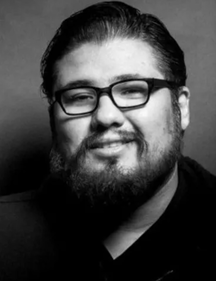
Archives
July 2024
April 2024
February 2024
July 2023
June 2023
May 2023
March 2023
February 2023
January 2023
November 2022
October 2022
September 2022
August 2022
May 2022
April 2022
March 2022
February 2022
January 2022
November 2021
October 2021
September 2021
August 2021
July 2021
June 2021
May 2021
March 2021
January 2021
December 2020
November 2020
October 2020
September 2020
August 2020
July 2020
June 2020
May 2020
April 2020
March 2020
February 2020
January 2020
November 2019
October 2019
September 2019
August 2019
July 2019
June 2019
May 2019
April 2019
March 2019
February 2019
January 2019
November 2018
September 2018
August 2018
July 2018
May 2018
April 2018
March 2018
February 2018
March 2017
January 2017
May 2016
February 2010
Categories
All
Archive
Argentina
Bilingüe
Book
Book Excerpt
Book Review
Boricua
California
Caribbean
Central American
Cesar Chavez
Chicano
Chicano/a/x
Chumash
Chupacabra
Círculo
Colombiana
Colombian American
Colonialism
Cuban American
Culture
Current Events
Death
Debut
Dia De Los Muertos
Diaspora
Dominican American
Dreams
East Harlem
Ecology / Environment
El Salvador
Emerging Writer
English
Excerpt
Family
Farmworker Rights / Agricultural Work / Labor Rights Issues
Flashback
Floricanto
Food
History
Identity
Immigration
Imperialism
Indigenous
Indigenous / American Indian / Native American / First Nations / First People
Interview
Language
Latin America
Love
Mature
Memoir
Memory
Mestizaje
Mexican American
Mexico
Nahuatl
Nicaraguan-diaspora
Nicaraguan-diaspora
Ofrenda
Patriarchy
Performance
Peruvian American
Poesia
Poesía
Poesía
Poet Laureate
Poetry
Prose Poetry
Puerto Rican Disapora
Puerto Rico
Racism
Review
Salvadoran
Social Justice
Southwest
Spanish
Spanish And English
Surrealism
Texas
Translation
Travel
Ulvalde
Visual Poetry
War
Women
Young-writers
Donate and Make Literature Happen
is published by the Somos En Escrito Literary Foundation,
a 501 (c) (3) non-profit, tax-exempt corporation. EIN 81-3162209



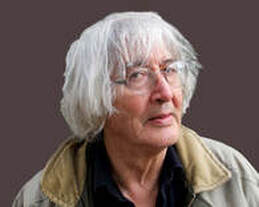
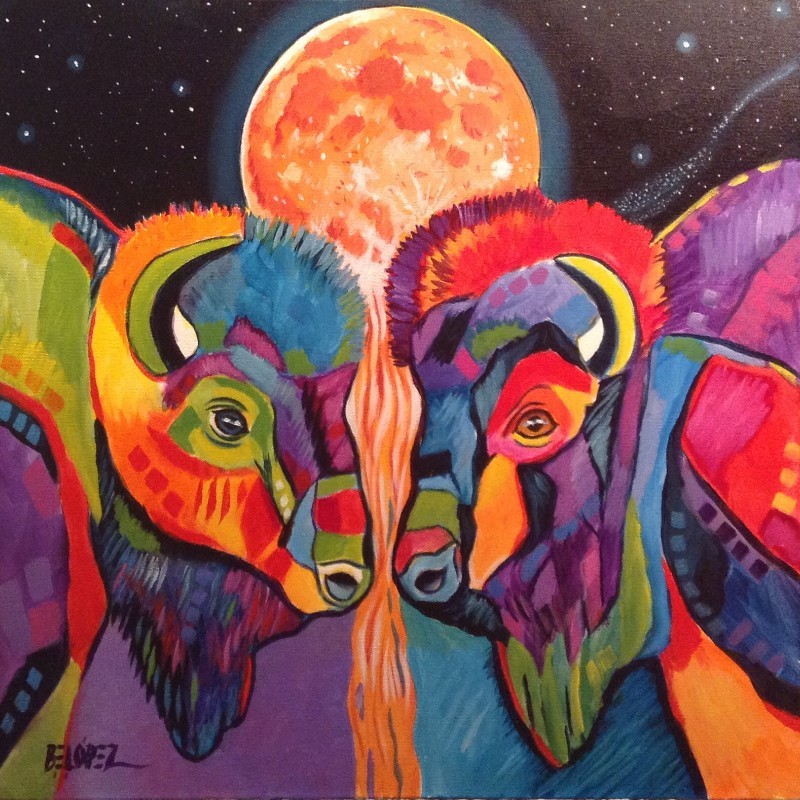
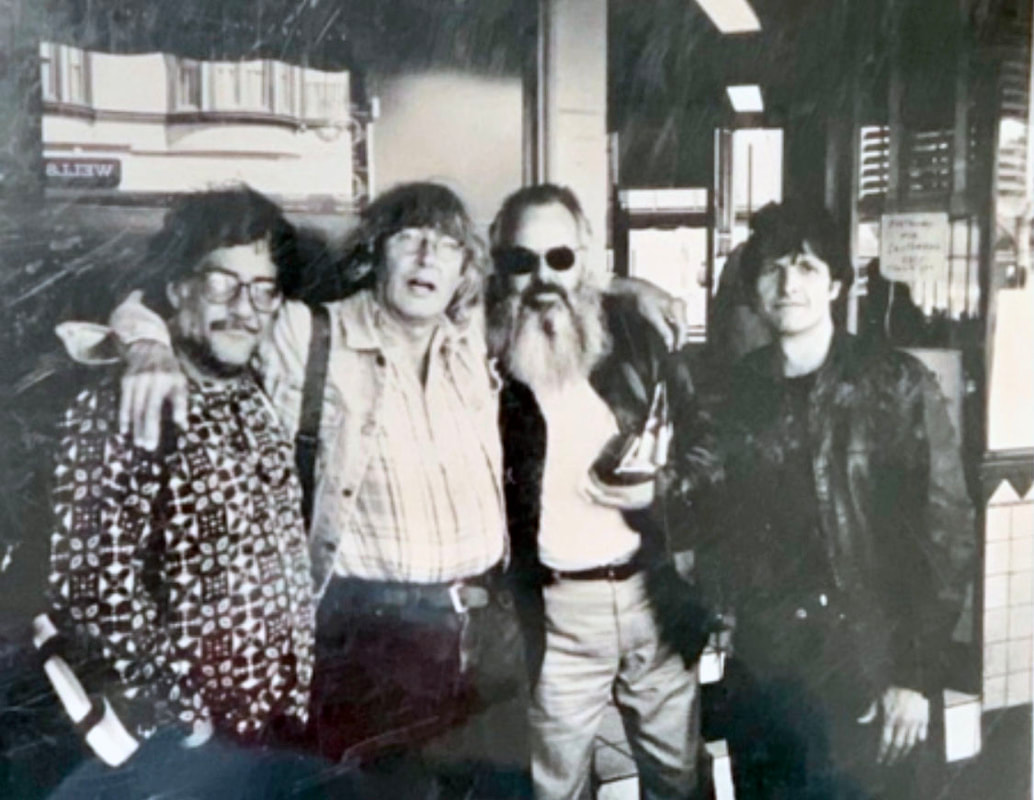
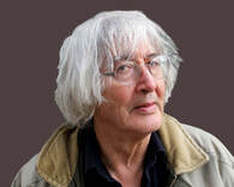


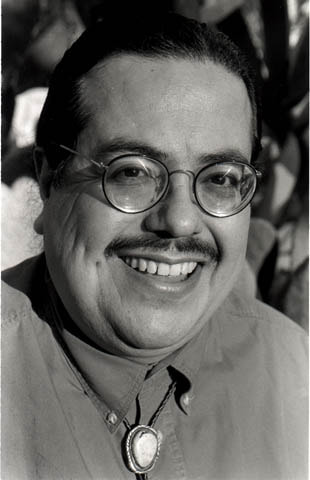

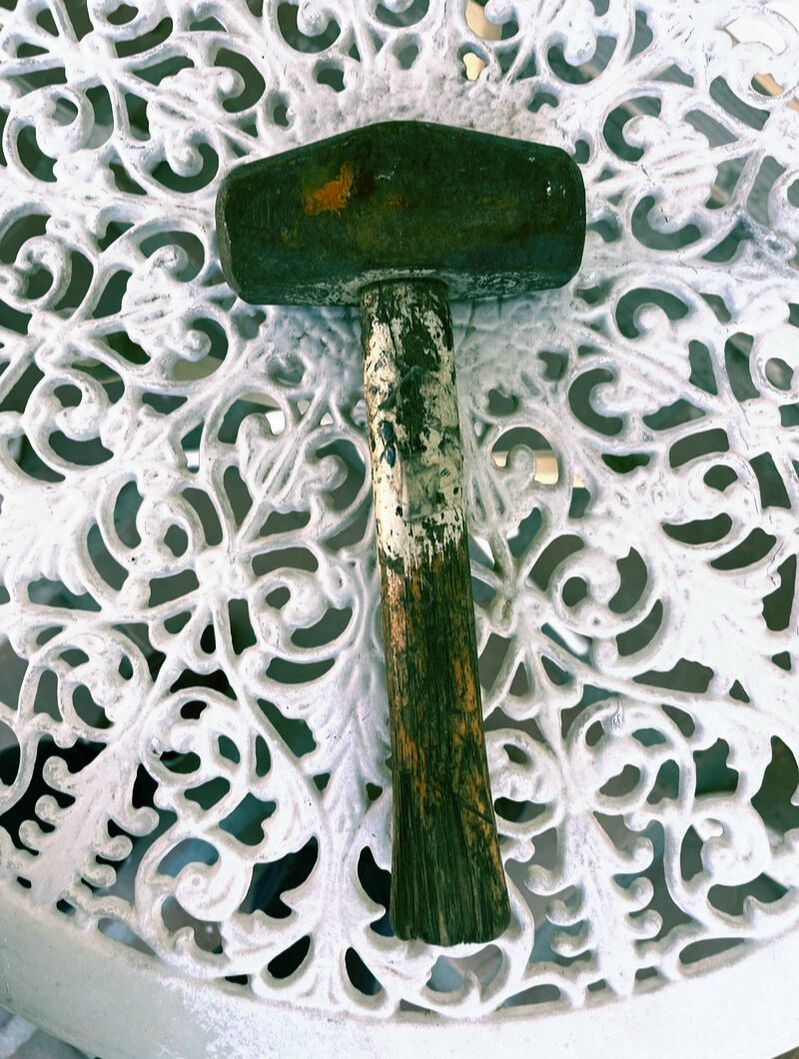
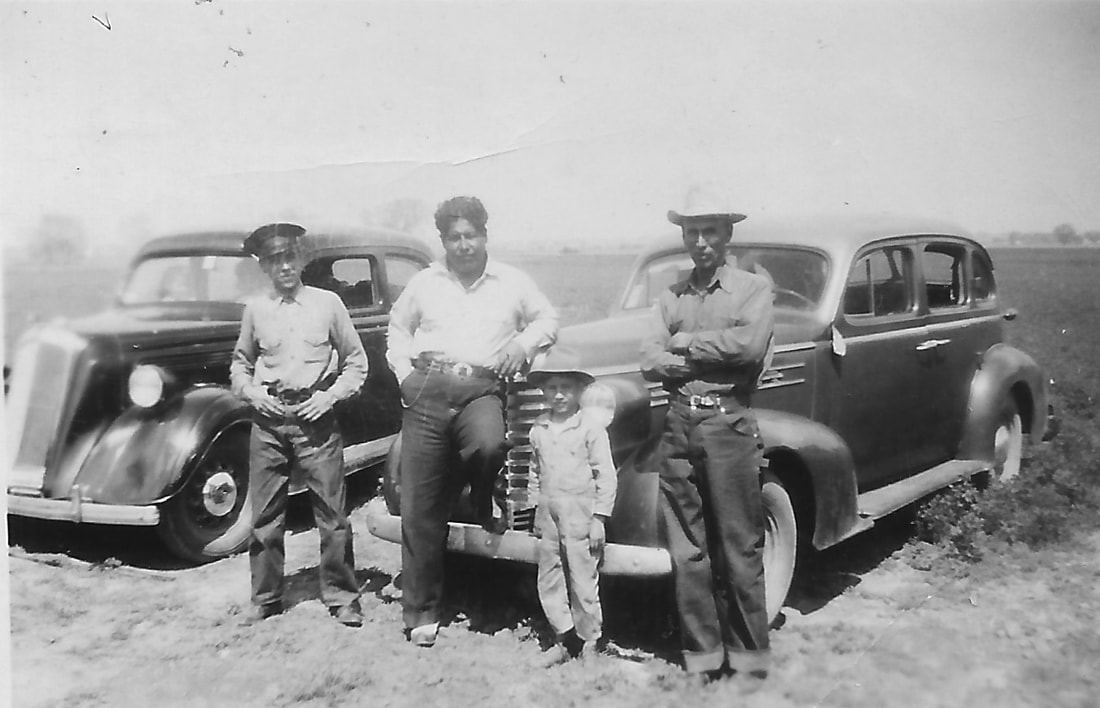
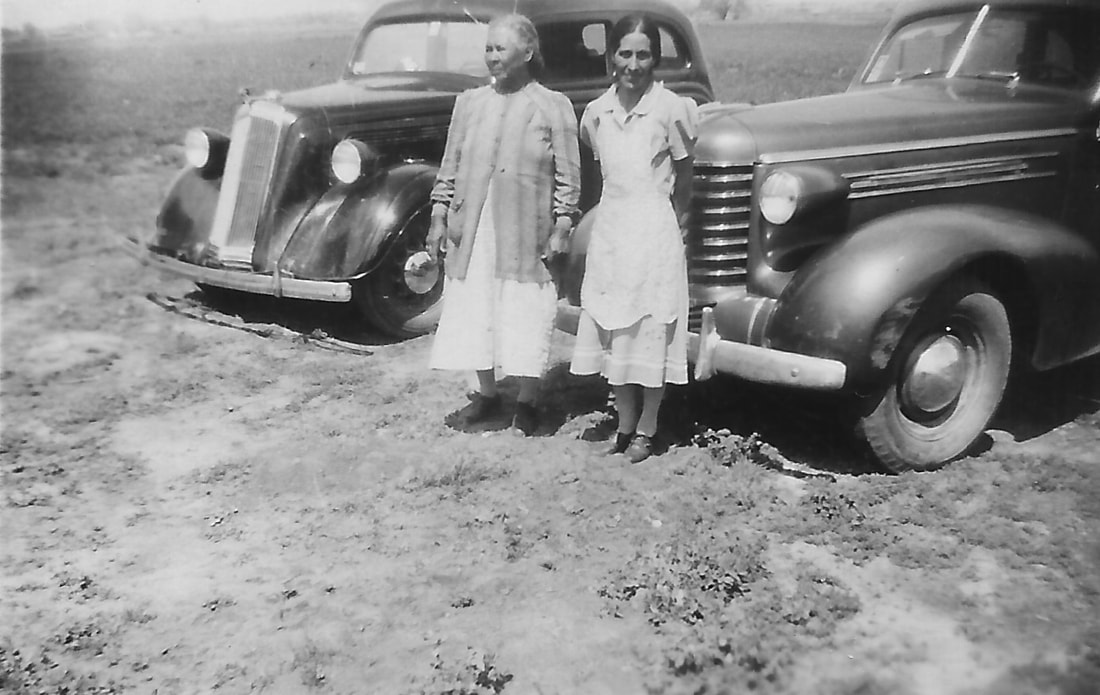
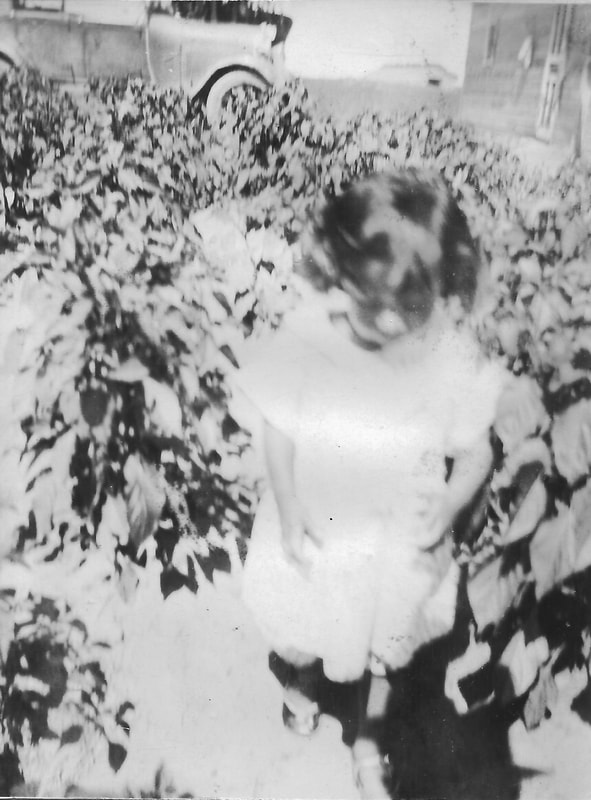
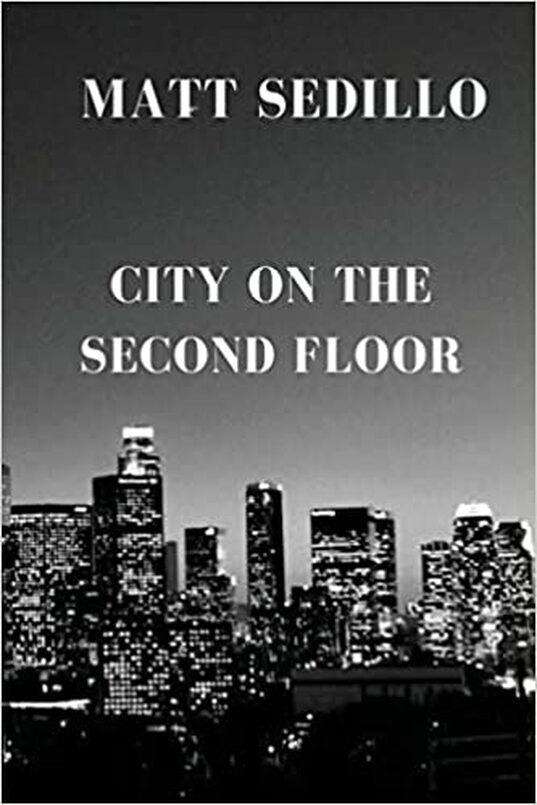
 RSS Feed
RSS Feed